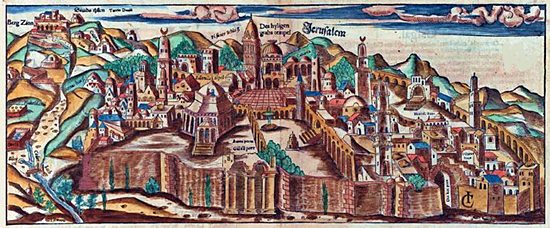
Fall of Jerusalem |
year: 637Nov 636 – Apr 637 |
| The Arabs captured Jerusalem | ★ ★ ★ ★ ★ |
|
enemy: Arabs
|
location: Jerusalem
|
accuracy:
●●●●●
|
|
battle type: City Capture |
war: Arab Conquest of Syria |
modern country:
Israel |
| ▼ The Byzantines(emperor: Heraclius) | ▼ The Enemies | |
| Commander: | Patriarch Sophronius | Abu Ubaidah, Khalid ibn al-Walid |
| Forces: | ||
| Losses: | none | none |
| Background story: |
| In 636, Emperor Heraclius launched a major campaign to regain lost territories, but his army was defeated decisively at the Battle of Yarmuk. Thereafter, Abu Ubaidah, the Muslim commander-in-chief in Syria, received instructions from Caliph Umar to capture Jerusalem. The Muslims arrived around early November, and the Byzantine garrison withdrew into the fortified city. Although the city had not been attacked until then, it had been in a state of siege since the Muslims captured the neighboring forts of Pella and Bosra. After Yarmuk, the city was presumably being prepared for a siege that seemed inevitable. When the Muslim army reached Jericho, Patriarch Sophronius collected all the holy relics including the True Cross, and secretly sent them to Antioch, to be taken to Constantinople. |
The Battle: |
 Medieval depiction of Jerusalem The Byzantine garrison could not expect any help from the humbled regime of Heraclius. After a siege of 4 months, Sophronius offered to surrender the city and pay a jizya (tribute), on condition that the caliph came to Jerusalem to sign the treaty. Upon Umar's arrival in Jerusalem, a pact known as The Umariyya Covenant was composed. It surrendered the city and gave guarantees of civil and religious liberty to Christians in exchange for a tribute. In late April 637, Jerusalem was officially surrendered to the caliph. |
Noteworthy: |
| Jews were allowed to live and practice their religion in Jerusalem again, nearly 500 years after their expulsion from Judea by the Roman Empire (except a 15-years break during Persian occupation). |
Aftermath: |
| The conquest of the city solidified Saracen control over Palestine, control which would not again be threatened until the 1st Crusade in the late 11th century. Thus, it came to be regarded as a holy site by Islam, too. |
|
|
